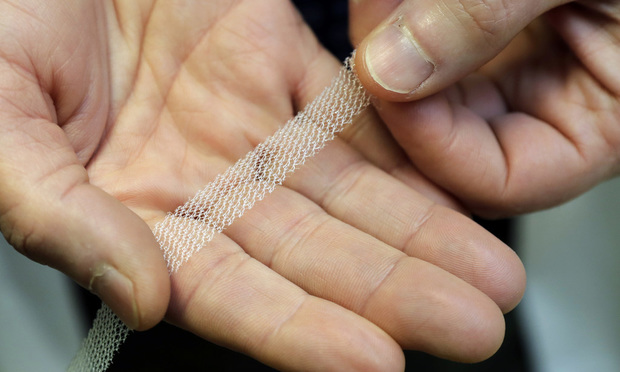Pa. Superior Court Shaves $5M From $20M Pelvic Mesh Verdict
The majority agreed that New Jersey's punitive damages cap should apply to the case and reduced that element by $5 million, to $12.5 million; on all other issues, though, the Superior Court majority said Ethicon either waived its arguments or failed to meet its burden to convince the court to alter the trial courts' decisions.
September 20, 2019 at 06:01 PM
4 minute read
 Dr. Jeffrey Clemons, a pelvic reconstructive surgeon, holds a sample of transvaginal mesh. AP Photo/Ted S. Warren
Dr. Jeffrey Clemons, a pelvic reconstructive surgeon, holds a sample of transvaginal mesh. AP Photo/Ted S. Warren
A Pennsylvania appellate court has rejected a medical device maker's attempts to toss a $20 million verdict, but has agreed that the verdict needed to be reduced by $5 million.
A split three-judge panel of the Superior Court on Friday largely affirmed the multimillion-dollar award a Philadelphia jury handed up in 2017 in Engleman v. Ethicon. The verdict, awarded to a woman allegedly injured by a defective pelvic mesh product, included $2.5 million in compensatory damages, as well as $17.5 million in punitive damages.
The majority agreed that New Jersey's punitive damages cap should apply to the case and reduced that element by $5 million, to $12.5 million; on all other issues, though, the Superior Court majority said Ethicon either waived its arguments or failed to meet its burden to convince the court to alter the trial court's decisions.
Superior Court Judge Deborah Kunselman, who wrote the majority's 31-page opinion, observed that New Jersey law caps punitive damages at five times the compensatory award in ordering the reduction.
All other elements of damages were upheld, however.
"Simply because the trial court reached conclusions that the manufacturers consider 'wrong' does not mean that the court abused its discretion," Kunselman said.
Cleveland attorney Benjamin Anderson of Anderson Law Offices tried the case on behalf of the plaintiff. Anderson did not immediately return a call for comment Friday afternoon.
Ethicon also did not return a call seeking comment.
In an emailed statement, Kline & Specter attorney Shanin Specter, who is a leading attorney in the mesh litigation and whose firm was involved in Engleman, said the products should be taken off the market.
"Over and over and over, juries have found Johnson & Johnson recklessly made and sold plastic mesh products that have caused permanent and crippling pelvic injuries in women," Specter said. "It's heartening to see these verdicts upheld by our trial and appellate courts."
Plaintiff Margaret "Peggy" Engleman, of Cinnaminson, New Jersey, alleged in court papers that she had Ethicon's TVT-Secur mesh implanted to help with her stress urinary incontinence, but her doctor discovered erosions in the material just two months later.
Engleman said in her pretrial memorandum that the eroding mesh began causing her pain and she was eventually forced to undergo three separate surgeries, under anesthesia, to remove the material. However, portions of the mesh remain in her body and she has developed chronic pain and urinary dysfunction, according to the memorandum.
Engleman alleged in court papers that TVT-Secur was "defective in design, warnings and instructions" and that Johnson & Johnson released the product to the public despite knowing that there was a significant risk that the mesh would erode inside patients.
Ethicon argued in its own pretrial memorandum that Engleman offered no evidence that the company "failed to warn of risks not within the common knowledge of pelvic floor surgeons."
The jury sided with Engleman and awarded the verdict in April 2017. It was the third pelvic mesh case to be tried in Philadelphia—all of which ended with a more than $10 million verdict.
On appeal, Ethicon challenged rules on the statute of limitations and several of the judge's evidentiary rulings. However, Kunselman, citing the Pennsylvania Supreme Court's recent decision in Nicolaou v. Martin, deferred to the jury's findings on the statute of limitations issue, and on other issues said Ethicon failed to meet its burden of proving error.
"The manufacturers totally ignore our deferential standard of review," Kunselman said, regarding the issue of remittitur for the compensatory award. "Because the manufacturers do not explain how the trial court abused its discretion, we dismiss this issue as affording them no relief."
Kunselman was joined by Superior Court President Judge Jack Panella.
Judge Alice Beck Dubow dissented, saying she saw numerous evidentiary errors by the trial court, and contended the majority was misapplying Nicolaou.
"To accept the majority's interpretation of Nicolaou would result in the limitations period commencing, in any case involving medical causation, only when a medical professional informs a patient of a link between the patient's condition and the cause of the condition," Dubow said. "However, the Supreme Court in Nicolaou specifically rejects the majority's expansive interpretation of the Discovery Rule."
This content has been archived. It is available through our partners, LexisNexis® and Bloomberg Law.
To view this content, please continue to their sites.
Not a Lexis Subscriber?
Subscribe Now
Not a Bloomberg Law Subscriber?
Subscribe Now
NOT FOR REPRINT
© 2025 ALM Global, LLC, All Rights Reserved. Request academic re-use from www.copyright.com. All other uses, submit a request to [email protected]. For more information visit Asset & Logo Licensing.
You Might Like
View All
Ozempic Defendants Seek to Shave 'Tacked On' Claims From MDL Complaint
3 minute read
Plaintiff Argues Jury's $22M Punitive Damages Finding Undermines J&J's Talc Trial Win
4 minute read
'Discordant Dots': Why Phila. Zantac Judge Rejected Bid for His Recusal
3 minute read
Pittsburgh Jury Tries to Award $22M Against J&J in Talc Case Despite Handing Up Defense Verdict
4 minute readTrending Stories
- 1Parties’ Reservation of Rights Defeats Attempt to Enforce Settlement in Principle
- 2ACC CLO Survey Waves Warning Flags for Boards
- 3States Accuse Trump of Thwarting Court's Funding Restoration Order
- 4Microsoft Becomes Latest Tech Company to Face Claims of Stealing Marketing Commissions From Influencers
- 5Coral Gables Attorney Busted for Stalking Lawyer
Who Got The Work
J. Brugh Lower of Gibbons has entered an appearance for industrial equipment supplier Devco Corporation in a pending trademark infringement lawsuit. The suit, accusing the defendant of selling knock-off Graco products, was filed Dec. 18 in New Jersey District Court by Rivkin Radler on behalf of Graco Inc. and Graco Minnesota. The case, assigned to U.S. District Judge Zahid N. Quraishi, is 3:24-cv-11294, Graco Inc. et al v. Devco Corporation.
Who Got The Work
Rebecca Maller-Stein and Kent A. Yalowitz of Arnold & Porter Kaye Scholer have entered their appearances for Hanaco Venture Capital and its executives, Lior Prosor and David Frankel, in a pending securities lawsuit. The action, filed on Dec. 24 in New York Southern District Court by Zell, Aron & Co. on behalf of Goldeneye Advisors, accuses the defendants of negligently and fraudulently managing the plaintiff's $1 million investment. The case, assigned to U.S. District Judge Vernon S. Broderick, is 1:24-cv-09918, Goldeneye Advisors, LLC v. Hanaco Venture Capital, Ltd. et al.
Who Got The Work
Attorneys from A&O Shearman has stepped in as defense counsel for Toronto-Dominion Bank and other defendants in a pending securities class action. The suit, filed Dec. 11 in New York Southern District Court by Bleichmar Fonti & Auld, accuses the defendants of concealing the bank's 'pervasive' deficiencies in regards to its compliance with the Bank Secrecy Act and the quality of its anti-money laundering controls. The case, assigned to U.S. District Judge Arun Subramanian, is 1:24-cv-09445, Gonzalez v. The Toronto-Dominion Bank et al.
Who Got The Work
Crown Castle International, a Pennsylvania company providing shared communications infrastructure, has turned to Luke D. Wolf of Gordon Rees Scully Mansukhani to fend off a pending breach-of-contract lawsuit. The court action, filed Nov. 25 in Michigan Eastern District Court by Hooper Hathaway PC on behalf of The Town Residences LLC, accuses Crown Castle of failing to transfer approximately $30,000 in utility payments from T-Mobile in breach of a roof-top lease and assignment agreement. The case, assigned to U.S. District Judge Susan K. Declercq, is 2:24-cv-13131, The Town Residences LLC v. T-Mobile US, Inc. et al.
Who Got The Work
Wilfred P. Coronato and Daniel M. Schwartz of McCarter & English have stepped in as defense counsel to Electrolux Home Products Inc. in a pending product liability lawsuit. The court action, filed Nov. 26 in New York Eastern District Court by Poulos Lopiccolo PC and Nagel Rice LLP on behalf of David Stern, alleges that the defendant's refrigerators’ drawers and shelving repeatedly break and fall apart within months after purchase. The case, assigned to U.S. District Judge Joan M. Azrack, is 2:24-cv-08204, Stern v. Electrolux Home Products, Inc.
Featured Firms
Law Offices of Gary Martin Hays & Associates, P.C.
(470) 294-1674
Law Offices of Mark E. Salomone
(857) 444-6468
Smith & Hassler
(713) 739-1250





